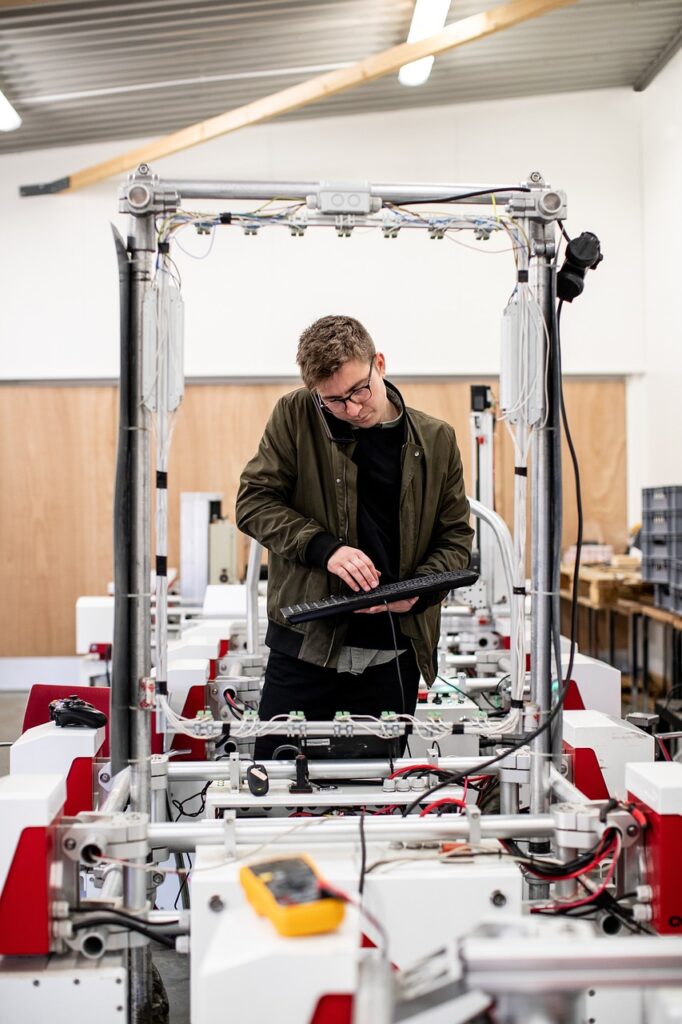The world of work has always evolved—but never as rapidly or drastically as it does today. Throughout history, every major technological leap has reshaped the employment landscape. When machines began replacing manual labor during the Industrial Revolution, thousands of weavers and craftsmen were displaced as textile factories took over.
In the 20th century, typewriters gave way to computers, reducing the demand for typists and clerks. More recently, ATMs have replaced many bank tellers, digital cameras have phased out film developers, and online streaming services have pushed video rental stores into extinction. The message is clear: adapt or risk becoming obsolete.
Fast-forward to the present day, and that pace of change has only accelerated. A glance at modern recruitment websites reveals roles like Social Media Manager, App Developer, Drone Operator, and even Virtual Reality Architect—positions that didn’t exist just a decade ago.
Meanwhile, entire industries have been disrupted by automation, artificial intelligence, and the digital economy. Just look at ride-hailing services like Uber, which have challenged traditional taxi systems, or e-commerce giants like Amazon, whose robotic fulfillment centers are redefining logistics.
What happens to those who don’t—or can’t—adapt? Unfortunately, history is full of cautionary tales.

Photographers who clung to film while the world went digital, retailers who ignored e-commerce trends, and travel agents who resisted online booking systems all found themselves edged out of once-thriving careers.
In each case, the inability to embrace new technologies meant missing out on emerging opportunities—and losing relevance in a changing market.
As we stare down a future where experts predict that 85% of the jobs that will exist in 2030 haven’t even been invented yet, the challenge is no longer just about choosing the right career path—it’s about preparing for continuous evolution.
To stay employable, competitive, and successful, we must not only understand the forces reshaping our work but also develop the skills and mindset to thrive amid constant transformation.
In today’s fast-paced digital world, the job landscape is shifting dramatically—and fast.
A glance at any recruitment website will reveal roles like Social Media Manager, Mobile App Developer, or even Uber Driver—jobs that barely existed a decade ago.
Technological innovation, from smartphones to artificial intelligence, has transformed not just how we live, but also how we work.
As we look toward the future, understanding how to adapt, upskill, and prepare ourselves for what lies ahead becomes more essential than ever.
The Future of Work is Here
Consider this: the first iPhone was introduced in 2007, and today, nearly half the global population owns a smartphone.
Advances in machine learning, robotics, and automation have also accelerated at an incredible pace.
For example, Amazon’s use of intelligent robots in its fulfillment centers is just one illustration of how traditional jobs are being reshaped—or in some cases, replaced—by machines.
While automation may displace certain types of labor, it also generates entirely new job categories.

Social media marketers, app developers, and AI specialists are all roles that didn’t exist a generation ago but are now essential in the digital economy.
The question we all face is: how do we prepare for this future? Especially when research suggests that up to 85% of the jobs that will exist in 2030 haven’t even been invented yet.
The Rise of Artificial Intelligence and Its Influence on Careers
One of the most significant forces reshaping the job market is artificial intelligence (AI). This powerful technology is quickly being integrated into everyday tools—smartphones, vehicles, home appliances, and more.
ALSO READ: Survive and Thrive: Why Embracing AI is the Key to Future-Proofing Your Career
AI applications like ChatGPT, Midjourney, DALL·E, and GPT-4 are revolutionizing how we communicate, create, and problem-solve.
While these advancements offer exciting opportunities, they also pose a challenge: automation can outperform humans in specific tasks, raising concerns about job security in certain industries.
If machines can execute tasks with greater accuracy and efficiency, what is left for human workers?
Future-Proof Skills in the Age of Automation
Thankfully, it’s not all bad news. While AI is incredibly adept at data analysis, pattern recognition, and even generating content, it still falls short in areas that require emotional intelligence, creativity, and complex decision-making.
These are the uniquely human attributes that remain difficult to replicate in machines.
To remain competitive in the job market of tomorrow, workers must double down on their soft skills—interpersonal communication, empathy, leadership, and emotional intelligence.
These qualities are especially critical in roles that require collaboration, people management, or nuanced judgment.
Even in highly technical fields, these skills are becoming increasingly valued.
Additionally, careers involving strategic thinking, innovation, and long-term planning are far more resistant to automation.
Machines may be able to make tactical decisions, but they struggle with imaginative or abstract thinking—an area where humans still dominate.
Adapting to a Changing Employment Landscape
It’s not only the types of jobs that are changing; the structure of employment itself is also undergoing a transformation.
The traditional 9-to-5 job model is slowly giving way to more fluid arrangements—remote work, freelancing, and contract-based roles are becoming more common.
The gig economy has been a significant catalyst in this shift.
Companies like Uber, Fiverr, and Deliveroo have normalized short-term, flexible work opportunities.
While some see this as empowering—offering more autonomy and flexibility—others criticize the lack of job security and benefits.
Whether the gig economy continues to expand or fades with economic recovery, one thing remains clear: adaptability is a crucial asset for anyone entering the job market.
The Entrepreneurial Advantage
One of the most effective ways to future-proof your career is by embracing entrepreneurship.
As automation continues to reduce the need for repetitive tasks and routine jobs, individuals with an entrepreneurial mindset will be best positioned to create their own opportunities.
Entrepreneurs are problem-solvers, innovators, and self-starters—all traits that remain in high demand and are unlikely to be replaced by machines.
In fact, technology has made starting a business more accessible than ever. From launching an e-commerce store to developing a tech startup, modern tools enable aspiring entrepreneurs to reach global markets with minimal resources.
Moreover, as traditional job roles become less stable, entrepreneurship offers a proactive approach to career security.
Rather than waiting for the next job to open up, individuals can build their ventures around skills they are passionate about.
Embrace Change—Don’t Resist It
Perhaps the most important mindset shift when preparing for the future of work is to stop fearing change and start embracing it.
Technological advancements are not inherently threats—they’re tools. And like any tool, their value depends on how we use them.
Take Amazon’s example once again. When the company introduced robots in its warehouses, it didn’t immediately lay off employees.

Instead, workers were trained in new roles—operating, maintaining, and improving the robotic systems. This kind of adaptation is not just a smart business strategy; it’s a model for how workers across industries can stay relevant and valuable.
Early Education in Emerging Technologies
To stay ahead, the next generation must be equipped with the knowledge and skills necessary to thrive in a tech-centric future. Investing in STEM education (Science, Technology, Engineering, and Mathematics) from an early age can lay a strong foundation for tomorrow’s workforce.
Institutions like the Oxford Scholastica Academy offer forward-thinking programmes such as their Technology Summer School and Computer Science Summer School, designed specifically for high school students.
These programs provide immersive experiences in emerging technologies, preparing students to adapt and excel in the digital economy.
Enrolling in such programs not only builds technical proficiency but also nurtures critical thinking, innovation, and problem-solving skills that will be invaluable regardless of what new job titles emerge in the coming decades.
The Power of Lifelong Learning
Another essential strategy for staying employable in the evolving world of work is committing to lifelong learning.
The most successful professionals in the future won’t necessarily be the ones with the most degrees, but those who are continuously learning, evolving, and growing with the times.
Online platforms like Coursera, Udemy, and edX offer access to courses in everything from machine learning to emotional intelligence.
This makes it easier than ever to stay updated on industry trends, learn new skills, or pivot into a different career path.
By maintaining a learner’s mindset, professionals can remain flexible and open to opportunities—even in industries that have yet to be born.
Human-Centric Careers Are Here to Stay
Even in a world dominated by technology, human interaction will never go out of style. Jobs in healthcare, education, counseling, and social work rely on empathy, communication, and ethical judgment—all qualities that technology can support but not replace.
Furthermore, creative roles—artists, writers, designers, filmmakers—though influenced by AI tools, still require a human touch to evoke emotion, inspire others, and communicate ideas. The future may be digital, but it will always need a human element.
Conclusion
The future of work isn’t just about avoiding job loss—it’s about seizing new opportunities.
As automation and AI reshape the professional landscape, those who adapt, embrace change, and continuously develop themselves will be best prepared to thrive.
Whether you’re a student planning your career, a professional considering a transition, or an educator helping others prepare, the message is clear: Invest in your skills, cultivate your creativity, build strong human relationships, and stay open to learning.
In the end, what will truly set you apart in the future of work isn’t just your ability to code or use AI—but your ability to think critically, connect emotionally, and act boldly in the face of change.



1 Comment
Pingback: Top AI Tools for Social Media: Create Smarter, Post Faster, and Boost Engagement in 2025 - Magic Media